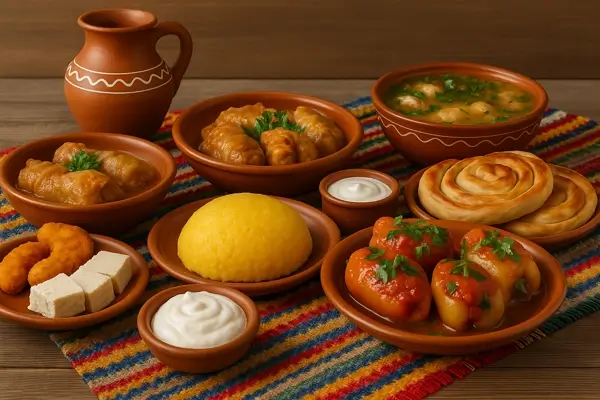
Moldova, a country rich in culinary traditions, offers a delightful array of national dishes that reflect its cultural heritage and local flavors. The cuisine of Moldova combines influences from neighboring countries, such as Romania, Ukraine, and Russia, resulting in a unique and diverse gastronomy. Let's explore some of the national dishes that make Moldovan cuisine special.
Mămăligă: Mămăligă is a traditional Moldovan dish often considered the national dish of the country. It is a type of cornmeal porridge, similar to polenta, made by boiling cornmeal with water and salt. Mămăligă is usually served as a side dish with various stews, grilled meats, or cheese. Its hearty texture and subtle corn flavor make it a staple in Moldovan cuisine. Recipe
Sarmale: Sarmale, also known as stuffed cabbage rolls, is a popular dish in Moldova. It consists of cabbage leaves filled with a mixture of ground meat, rice, onions, and spices. The rolls are then simmered in a savory tomato sauce until tender and flavorful. Sarmale is often served with sour cream and enjoyed during festive occasions and family gatherings. Recipe
Plăcinte: Plăcinte are traditional Moldovan pastries that come in various shapes and fillings. They can be sweet or savory and are made with a flaky dough filled with ingredients such as cheese, potatoes, cabbage, or fruits like apples or cherries. Plăcinte are typically baked or fried and are enjoyed as a snack or breakfast item. Recipe
Zeamă: Zeamă is a traditional Moldovan soup known for its comforting and nourishing qualities. It is a chicken or pork-based broth flavored with vegetables, such as carrots, potatoes, onions, and celery. The soup is often finished with a squeeze of lemon juice and served with sour cream and fresh herbs. Zeamă is a popular choice during cold winter months. Recipe
Mititei: Mititei, also called mici, are grilled ground meat rolls that are commonly enjoyed in Moldova. They are made from a mixture of ground beef, lamb, and pork, seasoned with spices like garlic, black pepper, and thyme. Mititei are typically served with mustard, bread, and a side of pickles, offering a flavorful and satisfying grilled meat experience. Recipe
Ghiveci: Ghiveci is a traditional Moldovan vegetable stew that showcases the abundance of seasonal vegetables. It is made by simmering a variety of vegetables, including eggplant, zucchini, bell peppers, tomatoes, onions, and carrots, in a savory broth. Ghiveci can be enjoyed as a vegetarian main dish or served as a side alongside grilled meats. Recipe
Pârjoale: Pârjoale are Moldovan-style meatballs made with a mixture of ground meat, onions, garlic, breadcrumbs, and spices. They are typically pan-fried until golden brown and served with mashed potatoes, vegetables, or a side salad. Pârjoale are a comforting and flavorful dish commonly found in Moldovan households. Recipe
Plăcinte cu brânză: Plăcinte cu brânză are Moldovan cheese pies made with a delicate pastry dough and filled with a savory cheese filling. The cheese used can vary, but it is often a mixture of feta cheese and fresh cheese. Plăcinte cu brânză are baked until golden and served hot as a snack or appetizer. Recipe
Piftie: Piftie is a traditional Moldovan dish that consists of a jellied meat or fish broth. It is made by simmering meat or fish with vegetables and herbs until the liquid becomes gelatinous. Piftie is typically served cold and sliced into pieces, often accompanied by mustard and pickles. Recipe
Papanași: Papanași is a beloved Moldovan dessert that satisfies any sweet tooth. It is a type of fried doughnut made from a mixture of cottage cheese, eggs, flour, sugar, and a touch of lemon zest. Papanași are typically served with a dollop of sour cream and a generous drizzle of berry compote, offering a delightful combination of flavors and textures. Recipe
These are just a few examples of the national dishes you can find in Moldova. The country's cuisine is a reflection of its rich food culture and culinary heritage, offering a wide range of flavors and tastes that are sure to delight both locals and visitors.
